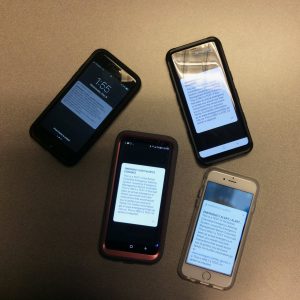During an emergency, police, fire and ambulance responders are there to help you and, in the event of a major disaster, this won’t change.

However, in a major emergency or disaster situation, police, fire and ambulance personnel cannot be everywhere at once and prioritizing calls will take on even a greater importance in order to help those in life-threatening situations. You can prepare yourself for both major and minor emergencies for your own safety and to help keep emergency responders available for those in dire need.
Download our Dialing 9-1-1 after an Earthquake info card.
Although many redundancies are built into telephone networks, a major disaster such as an earthquake could impact service, including access to 9-1-1 (another good reason to have a personal emergency plan). One of the most important ways people can support emergency services after an earthquake, large or small, is to stay off phones while service is restored or to keep congestion to a minimum. We received a 1,500 per cent increase in 9-1-1 calls after a 4.7 earthquake in 2015. The vast majority of those calls were not emergencies.
Here’s how you can help:

- After the shaking stops and it’s safe to come out from cover, ensure all phones are on the hook
- Do not use the telephone immediately unless a life is at stake
- If you have a serious emergency, dial 9-1-1. If you hear a busy signal, hang up and dial again. If you receive a recorded announcement, stay on the line and wait for a call-taker. Do not hang up. Your call will be answered as soon as possible.
- Do not call 9-1-1 for general information or to ask questions about the earthquake
- Help keep 9-1-1 lines free for those with serious emergencies
- Listen to your radio and TV for instructions and information, including finding out when it’s clear to telephone relatives and friends
Below is a basic list of tips and items for an emergency kit. For detailed information on emergency preparedness, contact the Provincial Emergency Program at 250-952-4913 or check out our recommended links.
- Pre-select a meeting place for your family in case of emergency
- Carry identification with you at all items, including medical information
Assemble a fire-proof and water-proof emergency kit (keep copies of all important papers in your kit) that includes:
- Water
- First-aid kit that includes medication and supplies for infants and elderly persons along with any personal prescriptions
- Food that does not require refrigeration and takes little preparation
- Juice
- Clothing for both hot and cold weather
- Flashlight and batteries
- AM/FM radio and batteries
- Personal toiletry items such as soap, tissue, toothpaste, toothbrush
- Fire extinguisher, a wrench (to turn off gas) and a crowbar
- Shoes that are heavy enough to protect you from broken glass and other debris
- Matches and candles (DO NOT USE before checking for gas leaks)
- Generator (gasoline-powered) and heavy-duty electrical extension cord
- Shelter (a plastic tarp or tent), emergency blankets, large garbage bags
- Blankets and sleeping bags
Planning Tips:
To see the EMBC’s emergency plans, visit: BC Gov Provincial Emergency Planning Page
To learn about putting together an emergency plan and preparing an emergency kit, visit: BC Gov Build an Emergency Kit Page
To learn more about B.C.’s earthquake activity, visit: Earthquakes Canada
Alert Ready
 As of April 6, 2018, in addition to TV and Radio, Alert Ready will send life-threatening emergency alerts to cell phones and wireless devices that are compatible with Wireless Public Alerting (WPA). In order for emergency alerts to be received on a wireless device, three conditions must be met. The wireless device must be:
As of April 6, 2018, in addition to TV and Radio, Alert Ready will send life-threatening emergency alerts to cell phones and wireless devices that are compatible with Wireless Public Alerting (WPA). In order for emergency alerts to be received on a wireless device, three conditions must be met. The wireless device must be:
- An LTE-device like a smartphone (LTE is commonly referred to as “4G LTE”)
- Wireless public alerting (WPA)-compatible
- Connected to an LTE cellular network at the time the emergency alert is issued.
Recommended Links
- Public Safety Canada
- Emergency Management BC
- Health Canada – Emergencies & Disasters
- Emergency Preparedness in Vancouver – City of Vancouver
- Disaster Response Routes
- Get Prepared
- Prepared BC
- Emergency Info BC
- Prepare Yourself – Capital Regional District (CRD) Preparing Southern Vancouver Island for Emergencies
- Emergency Preparedness in Delta – Corporation of Delta
- Earthquakes Canada
- National Tsunami Warning Center – United States Department of Commerce

